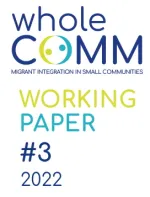Immigrant integration in small and mediumsized towns and rural areas: local policies and policymaking relations in Spain

Working Paper No. 3 - Spain
This report looks at multi-level governance dynamics and the resulting integration policies targeting post-2014 migrants in six small and medium-sized towns and rural areas across four different Spanish regions. Primarily based on interviews conducted in each of the selected municipalities, it provides an overview of 1) national and regional integration policies targeting post-2014 migrants; 2) policymaking relations among the key actors involved in these policy processes in the selected localities and key features of policy networks within which these actors interact; and 3) how these actors perceive and define integration. The report finds that national laws are often perceived as hindering integration while regional governments have significant competences in this field. Local governments do not describe the issue as particularly pressing or central to their agendas, and none of the six localities devised any specific (formal) policy or strategy for the integration of post-2014 migrants. Concrete challenges are either related to very specific groups (mostly unaccompanied minors) or framed as issues of conviviality and addressed through mainstream policies and measures.
Most of the local “integration work is publicly funded but done by NGOs and associations, while the business sector plays a very minor and rather reluctant role in relation to integration. Overall, the arrival of post-2014 migrants in the six localities does not seem to have caused any significant conflicts within the local community or among the different actors. Instead, most interviewees described very good relations and effective collaboration at the local level, especially between public and third-sector organisations.